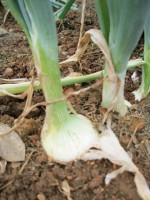 Growing onions can be a frustrating experience until you realize that success rests on selecting to correct onion variety. Of course the selection process is going to put flavor above all else, but then you must be guided by the number of daylight hours your part of the country receives during the growing season. Yes, onions are sensitive to daylength and they form bulbs when the daylength is to their liking. There is nothing you can do about this (except move), so you have to consider this factor if you want a good onion crop.
Growing onions can be a frustrating experience until you realize that success rests on selecting to correct onion variety. Of course the selection process is going to put flavor above all else, but then you must be guided by the number of daylight hours your part of the country receives during the growing season. Yes, onions are sensitive to daylength and they form bulbs when the daylength is to their liking. There is nothing you can do about this (except move), so you have to consider this factor if you want a good onion crop.
Onions can be classified on the basis of daylength. Shortday onions bulb up when they receive 11-12 hours of daylight; longday onions when they receive 14-16 hours of daylight; and intermediate day onions when they receive about 12-14 hours of daylight. Short day varieties are usually grown in the South, long day varieties in the North, and intermediate varieties in a belt between the two. Gardeners in the North (north the 36th parallel) usually plant in spring and harvest in summer while Southern gardeners plant in the fall and harvest in the spring. Fortunately your local nursery or feed store will probably carry the kinds of onions that can be successfully grown in your area but you need to buy them early and get them in the ground promptly so the plants are at the right stage when the daylight triggers bulb formation. Otherwise you may end up with tiny bulbs or none at all.
Let’s go back to flavor, probably the most important factor in onion selection for most people. Onions are either pungent or sweet. The pungent ones are good for storing, the sweet ones for eating raw. The main difference is the amount of sulfur in the onion. Sulfur gives the pungent ones their taste and also makes them store well. If you decide on a sweet variety you can help keep it sweet by growing it with plenty of water and eliminating weeds that compete for the water.
After you have decided on flavor preferences and determined the daylength constraints of the onion you have to decide to buy seed (not recommended), sets, or plants. The easiest way to grow onions is to use sets. These are small onions, are more reliable than seed, and will mature more quickly than seed or small plants. Small plants are not difficult to grow but are less mature at planting date so will take longer to mature than sets but less time than seed. Timing is important so make sure that whatever you decide to buy will be ready to bulb up when the daylength is appropriate so you get the biggest onions possible.
